
12 Best Marketing Automation Tools for E-commerce in 2025
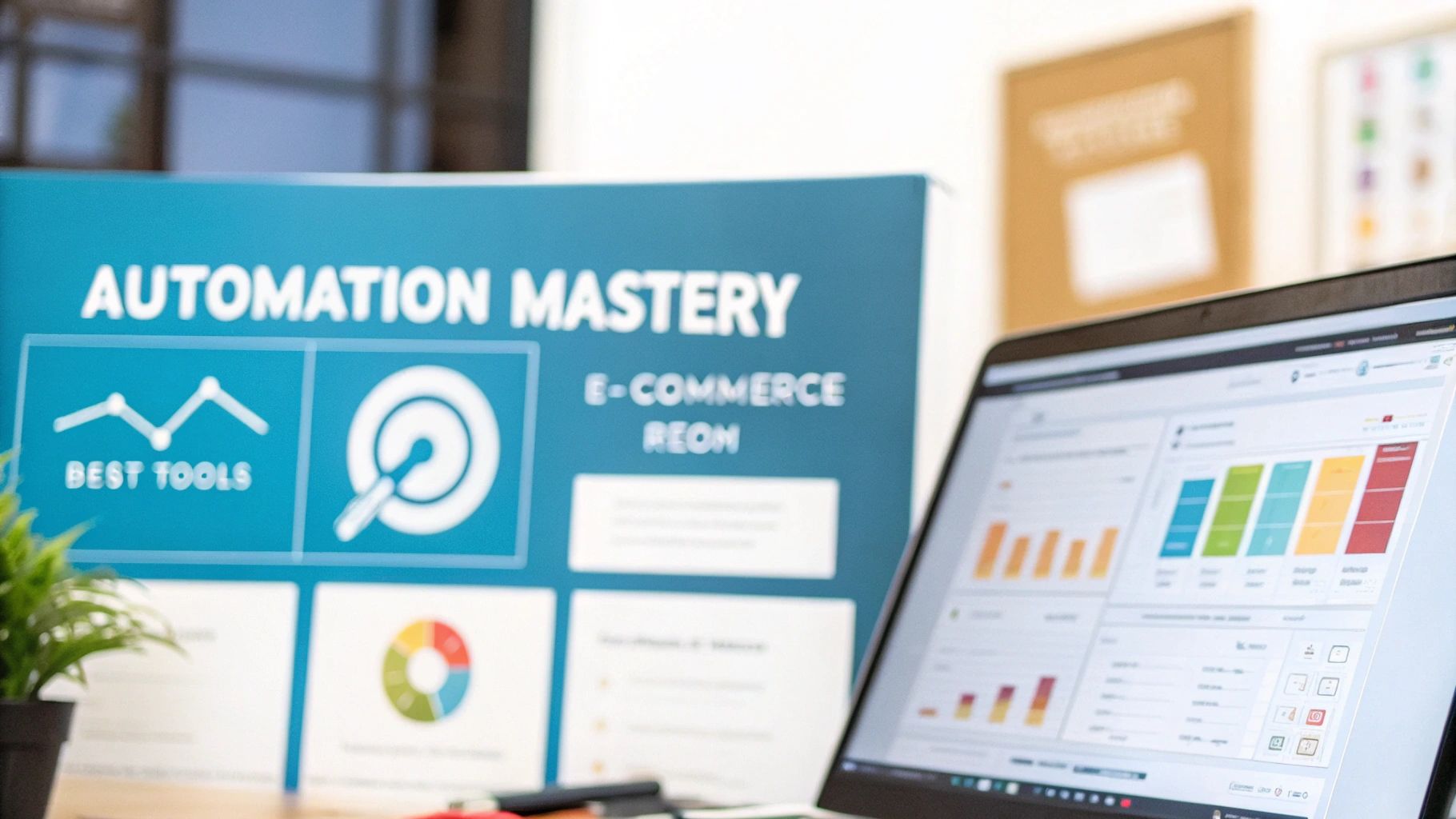
Choosing the right marketing automation tool can feel like navigating a maze. With countless platforms all claiming to boost ROI and streamline your efforts, it's difficult to separate the genuine game-changers from the generic feature-lists. The wrong choice can lead to wasted budget, a steep learning curve for your team, and missed revenue opportunities-a scenario no e-commerce brand, from a growing Shopify store to a Shopify Plus enterprise, can afford. The average e-commerce cart abandonment rate hovers around 70%, representing a massive pool of lost revenue that the right automation, grounded in proven psychology, can recover.
This guide cuts through the noise. We're not just listing platforms; we are providing a comprehensive, side-by-side analysis of the best marketing automation tools available today. We dive deep into the specific features, pricing tiers, integration capabilities, and ideal use cases for each option. Our focus is on practical, real-world application, helping you understand which platform truly aligns with your business goals, whether that's reducing cart abandonment, increasing customer lifetime value, or improving inventory management. For those looking to optimize their campaigns, understanding key marketing automation best practices is crucial for maximizing the impact of any tool you select.
Inside, you'll find detailed overviews of leading software like HubSpot, Klaviyo, and ActiveCampaign, complete with screenshots and direct links to get you started. We’ll examine how advanced behavioral triggers in certain platforms offer a more sophisticated approach than basic countdown timers, and how to select a tool that integrates seamlessly with your existing tech stack, including SMS and other email platforms. This resource is designed to move you from analysis paralysis to decisive action, equipping you with the information needed to select the perfect automation partner for sustained growth.
1. Quikly
Quikly stands out in the crowded field of marketing automation by mastering a specific, high-impact niche: urgency marketing. Instead of offering a broad suite of tools, it provides a sophisticated platform engineered to leverage core behavioral economics principles like scarcity, FOMO (Fear Of Missing Out), and anticipation. This specialized focus makes it an exceptionally powerful tool for e-commerce businesses, particularly those on the Shopify platform, looking to convert hesitant browsers into decisive buyers.
What sets Quikly apart is its scientific approach. It moves beyond basic countdown timers, which customers are increasingly ignoring, by employing advanced behavioral triggers and segmentation to create what it calls "Moments"- highly targeted, limited-time campaigns. This positions urgency not as a manipulative gimmick, but as a strategic application of consumer psychology designed to drive immediate revenue while protecting profit margins and avoiding blanket discounts. It's the difference between a simple pop-up focused on email capture and a sophisticated engine built for revenue generation.
Key Features & Business Impact
Quikly’s features are built for rapid implementation and measurable ROI, directly addressing critical e-commerce challenges like high cart abandonment rates (averaging 70%) and low conversion rates (averaging 2.5%).
- No-Code Moment Builder: This is a significant advantage for Shopify merchants. Brands can design, preview, and launch complex campaigns like limited-time drops or ranked offers in minutes. Crucially, this requires zero installation or theme code changes, eliminating a major technical barrier and allowing for immediate deployment.
- Advanced Audience Segmentation: The platform enables hyper-precise targeting. You can segment audiences based on purchase history, engagement level, or custom attributes from Klaviyo, ensuring your urgency-based offers reach the most receptive customers. This level of personalization dramatically increases relevance and effectiveness compared to one-size-fits-all pop-ups.
- Proven Revenue Lift: The platform's impact is quantifiable and swift. Clients consistently report significant uplifts within the first 24 hours, with typical results including a +41% increase in conversion rates, a +36% lift in total sales, and an +18% boost in average order value (AOV). This focus on tangible revenue generation, rather than just lead capture, makes it one of the best marketing automation tools for growth-focused brands.
- Inventory & Profit Margin Automation: Beyond sales, Quikly helps manage inventory by creating demand for specific products and protects margins by avoiding sitewide discounts. It integrates smoothly with tools like Klaviyo and other SMS platforms for cohesive campaign execution.
Ideal Use Case & Implementation
Quikly is the essential growth partner for Shopify and Shopify Plus merchants aiming to optimize conversions profitably. It's particularly effective for brands that run frequent promotions, new product launches, or flash sales.
Actionable Takeaway: To start, use a Quikly template for a "limited stock warning" campaign. Target it specifically to a segment of customers who have viewed a product multiple times but not purchased. This leverages the psychological principle of scarcity and often yields immediate ROI, providing a clear business impact benchmark.
| Feature | Primary Business Benefit |
|---|---|
| Urgency-Driven "Moments" | Converts passive browsers into immediate buyers, boosting revenue |
| No-Code Interface | Allows for instant campaign creation without technical overhead |
| Personalized Segmentation | Maximizes campaign relevance, AOV, and customer lifetime value |
| Real-Time Analytics | Provides actionable insights to optimize performance and profitability |
Pros:
- Drives significant and immediate ROI (+36% sales lift)
- User-friendly, no-code builder requires no theme changes for fast implementation
- Advanced segmentation for highly personalized, psychologically-driven campaigns
- Integrates with key Shopify ecosystem tools like Klaviyo and SMS platforms
- Comprehensive analytics with real-time optimization tips
Cons:
- Primarily optimized for the Shopify ecosystem
- Maximizing advanced strategies may benefit from support from their Client Success team
Website: https://hello.quikly.com
2. HubSpot Marketing Hub
HubSpot Marketing Hub stands out as an all-in-one platform that tightly integrates marketing automation with a powerful, free-forever CRM. This native connection allows e-commerce businesses to build sophisticated campaigns based on a complete history of customer interactions, from initial website visits to post-purchase support tickets. Its visual workflow builder is particularly intuitive, enabling users to orchestrate complex sequences involving email, ad retargeting, SMS, and dynamic on-site content without writing any code.
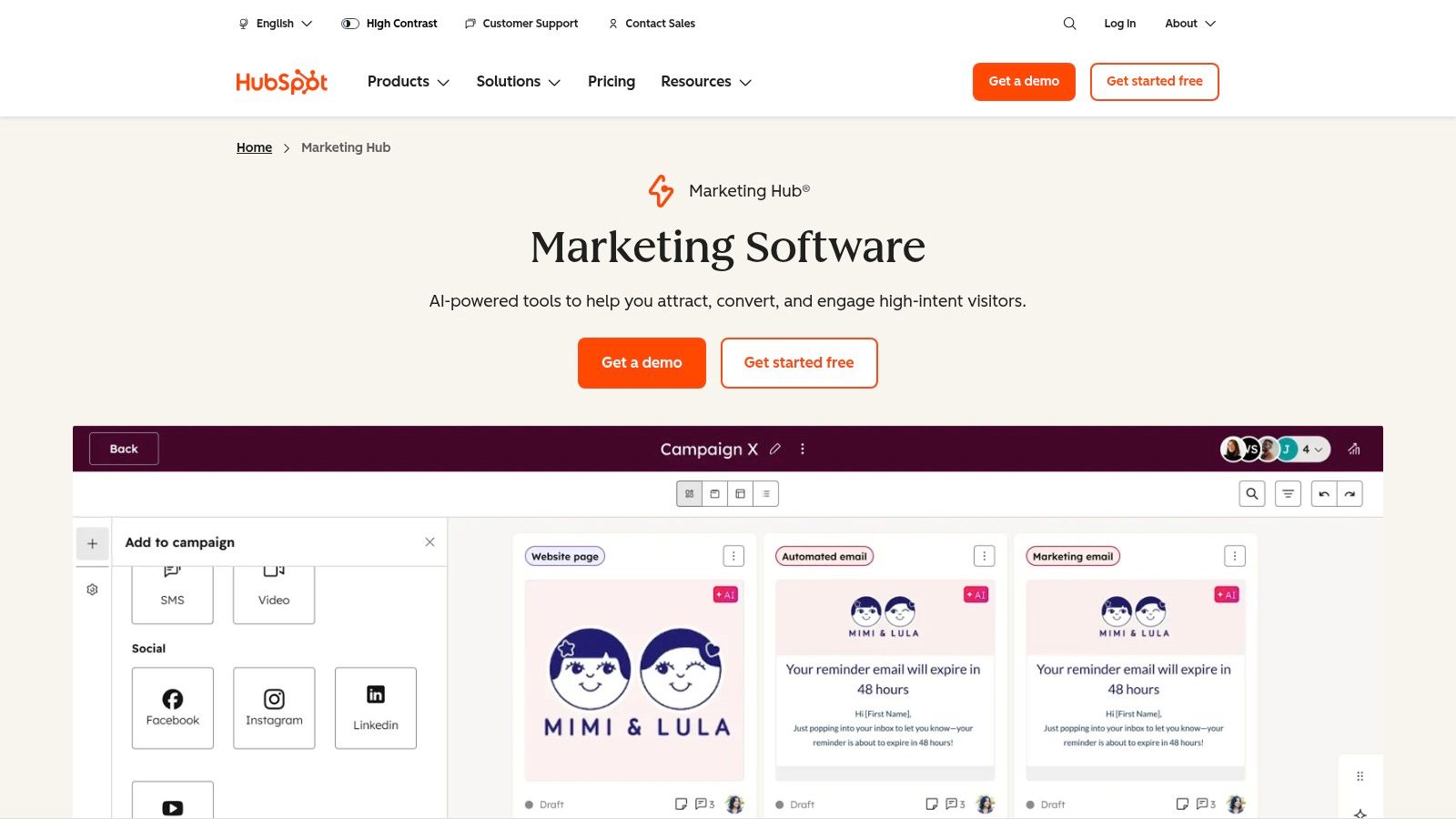
Unlike many competitors that focus solely on email, HubSpot's automation triggers can pull data from its entire ecosystem, including the Sales and Service Hubs. This makes it one of the best marketing automation tools for creating a unified customer experience. A practical use case for a Shopify store would be an abandoned cart workflow that not only sends a reminder email but also notifies a sales rep to follow up if the cart value is over $500, creating a high-touch recovery process.
Key Features & Pricing
HubSpot's strength lies in its scalability. You can start with a generous free plan and grow into robust enterprise features.
- Pricing: Begins with a Free tier. Paid plans are Starter (from $18/mo), Professional (from $800/mo), and Enterprise (from $3,600/mo).
- Unique Offerings: The Enterprise tier includes multi-touch revenue attribution, which directly connects marketing activities to sales revenue, providing clear ROI data.
- Integrations: A vast marketplace includes deep integrations with Shopify, Klaviyo, and hundreds of other e-commerce and marketing apps.
Pros:
- Excellent free tools to get started without initial investment.
- Extensive educational resources via HubSpot Academy.
- The unified platform provides a single source of truth for customer data.
Cons:
- Pricing scales based on the number of marketing contacts, which can become expensive quickly.
- Mandatory onboarding fees for Professional and Enterprise tiers add a significant upfront cost.
Website: https://www.hubspot.com/products/marketing
3. Salesforce Marketing Cloud Account Engagement (formerly Pardot)
Salesforce Marketing Cloud Account Engagement (formerly Pardot) is a B2B-focused powerhouse, designed for revenue teams that live inside the Salesforce ecosystem. Its core strength lies in its native, bi-directional sync with Salesforce CRM, allowing marketing and sales teams to work from a single, unified dataset. This deep alignment enables highly targeted lead nurturing and scoring based on comprehensive prospect activities tracked across web, email, and sales interactions, making it one of the best marketing automation tools for complex sales cycles.
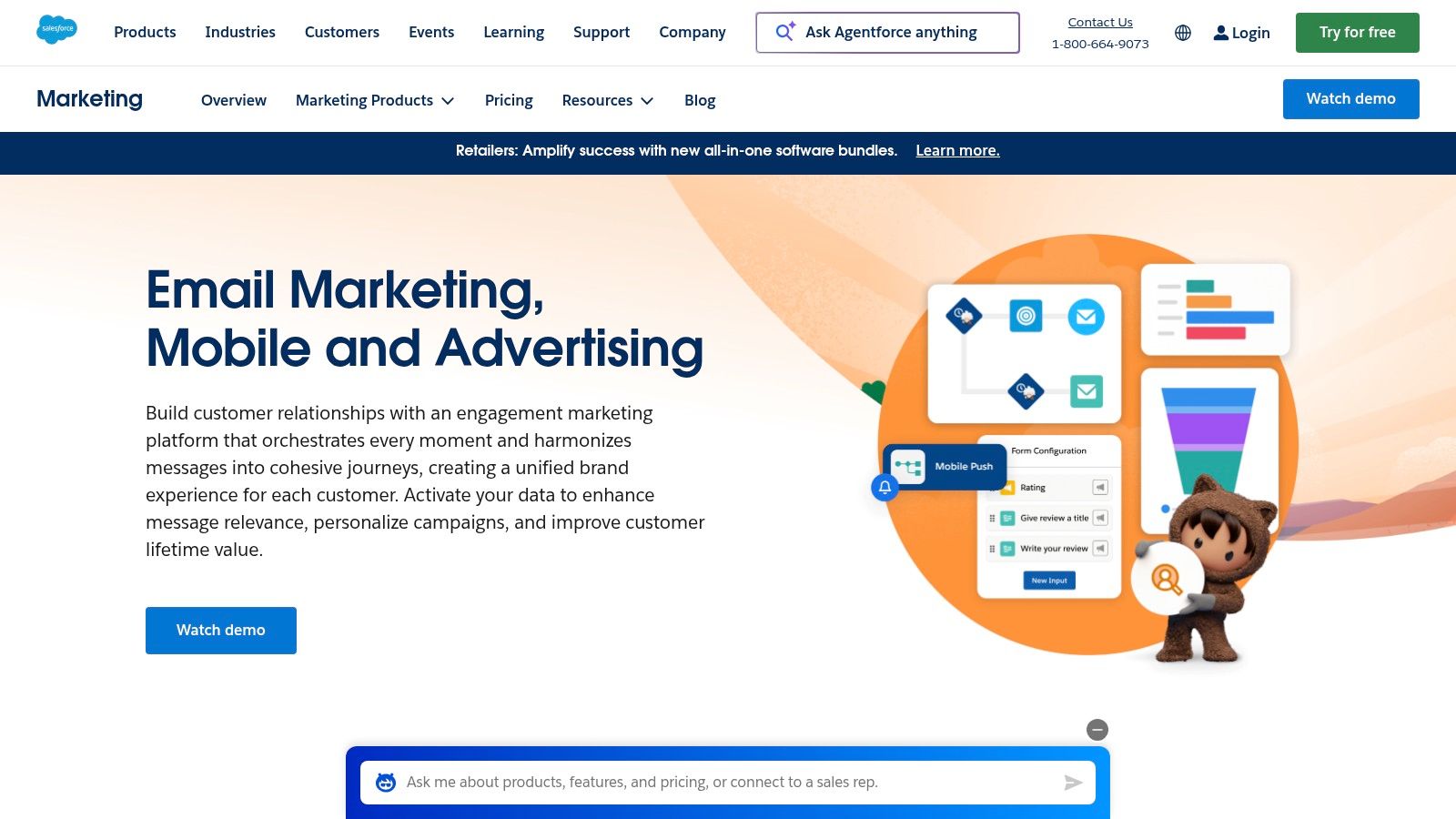
Unlike platforms built for high-volume B2C e-commerce, Account Engagement excels at account-based marketing (ABM) and measuring marketing influence on sales pipeline. Its Engagement Studio allows users to build sophisticated cross-channel journeys that can intelligently route leads to sales reps at the perfect moment. A practical use case for an enterprise e-commerce brand selling to wholesale accounts would be creating a journey that scores leads based on product page views and content downloads, then automatically assigning high-scoring accounts to the correct regional sales team within Salesforce.
Key Features & Pricing
Account Engagement is built for scalable, data-driven marketing with an emphasis on sales alignment and enterprise governance.
- Pricing: Begins with the Growth plan at $1,250/mo, followed by Plus at $2,750/mo, Advanced at $4,400/mo, and Premium at $15,000/mo. All plans are billed annually.
- Unique Offerings: The Advanced tier includes powerful B2B Marketing Analytics Plus dashboards and predictive lead scoring powered by Salesforce Einstein AI.
- Integrations: Natively connects to the entire Salesforce platform. While it has fewer pre-built marketing app integrations than competitors, its robust API allows for deep custom connections.
Pros:
- Unmatched, seamless integration with the Salesforce CRM data model.
- Advanced lead scoring, grading, and ABM capabilities are built-in.
- Scalable enterprise features like Business Units and developer sandboxes are available at higher tiers.
Cons:
- Premium pricing and mandatory annual contracts place it out of reach for many SMBs.
- The interface can have a steeper learning curve compared to more modern, visual-first platforms.
- Additional costs for features like a dedicated sending IP can add up.
Website: https://www.salesforce.com/products/marketing-cloud/account-engagement
4. Adobe Marketo Engage
Adobe Marketo Engage is an enterprise-grade powerhouse designed for complex, large-scale marketing operations. It excels in sophisticated lead management, making it one of the best marketing automation tools for B2B companies and B2C brands with long or intricate customer journeys. Its strength lies in its ability to manage account-based marketing (ABM) strategies and score leads based on deep behavioral and firmographic data, ensuring sales teams focus on the most qualified opportunities. The platform is built for orchestrating multi-channel campaigns that go far beyond simple email drips, incorporating digital ads, social media, and live events.
Unlike platforms geared toward smaller businesses, Marketo offers immense depth and customization. It natively integrates with major CRMs like Salesforce and Microsoft Dynamics, creating a seamless data flow between marketing and sales. For a high-consideration e-commerce brand, a practical use case would be identifying an entire account (e.g., a corporate buyer) showing interest, then launching a personalized campaign targeting multiple stakeholders at that company with tailored ads, content, and sales outreach, all orchestrated and tracked within Marketo.
Key Features & Pricing
Marketo is tailored for mature marketing teams requiring granular control and scalability.
- Pricing: Pricing is quote-based and not publicly listed, reflecting its enterprise focus. Tiers include Growth, Select, Prime, and Ultimate.
- Unique Offerings: The platform's advanced lead and account-based marketing (ABM) capabilities are a core differentiator, allowing marketers to target entire buying committees, not just individuals.
- Integrations: Offers robust, native integrations with Salesforce, Microsoft Dynamics, and Veeva, plus a wide partner ecosystem via the Adobe Exchange.
Pros:
- Extremely deep functionality for sophisticated and enterprise-level campaign management.
- Proven scalability to handle millions of contacts and complex workflows.
- Strong partner ecosystem for extensions and expert implementation support.
Cons:
- The learning curve is steep, and it requires significant resources and expertise to manage effectively.
- Opaque, quote-based pricing can be a barrier for all but the largest enterprises.
Website: https://business.adobe.com/products/marketo/marketo-engage.html
5. ActiveCampaign
ActiveCampaign is engineered for businesses that prioritize sophisticated, trigger-based automation without overwhelming complexity. It excels with a highly intuitive visual workflow builder, making it one of the best marketing automation tools for teams who need to deploy intricate customer journeys quickly. The platform's strength lies in its event-driven logic, allowing e-commerce stores to automate actions based on specific behaviors like website visits, video views, or interactions with past emails, creating deeply personalized and timely communication.
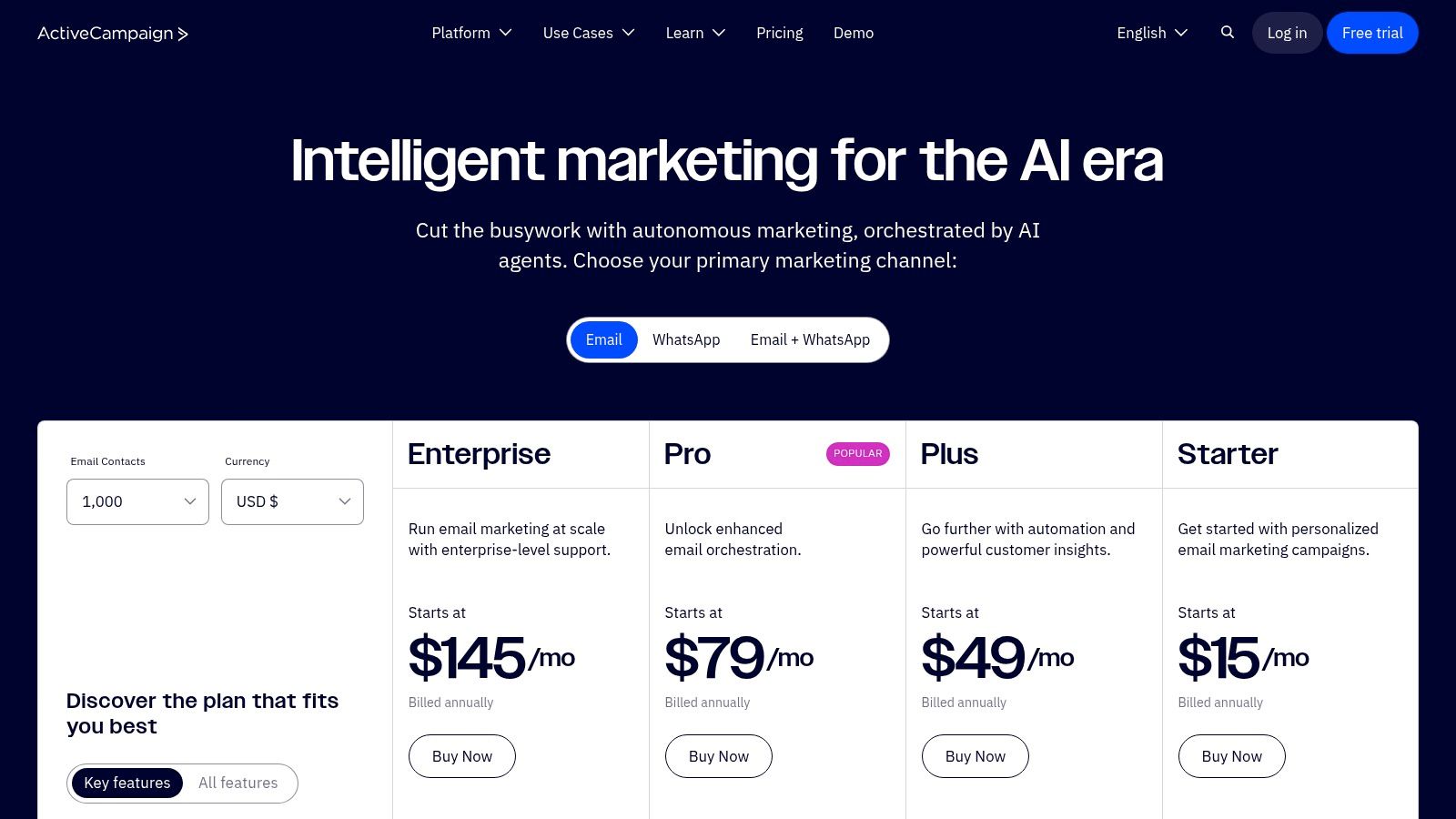
Unlike platforms that bundle all features into rigid tiers, ActiveCampaign offers a more modular approach with an optional sales CRM, SMS, and WhatsApp messaging. This allows businesses to start with powerful email and marketing automation and add channels as they scale. A practical use case for a Shopify brand is creating a post-purchase follow-up sequence that uses conditional logic to send different review requests or cross-sell recommendations based on the specific product purchased, all from within a single, easy-to-manage workflow.
Key Features & Pricing
ActiveCampaign's value is in its powerful automation engine, accessible even at lower-priced tiers, with clear send multipliers.
- Pricing: Begins with the Marketing Lite plan (from $29/mo). Higher tiers are Plus (from $49/mo), Professional (from $149/mo), and Enterprise (contact for pricing).
- Unique Offerings: The platform provides over 900 pre-built automation "recipes" that give users a significant head start on building common workflows for e-commerce, such as abandoned cart reminders and re-engagement campaigns.
- Integrations: Offers a massive library of over 950 integrations, including deep connections with Shopify, BigCommerce, Salesforce, and many other critical e-commerce tools.
Pros:
- Extremely intuitive drag-and-drop automation builder.
- Transparent send multipliers across tiers prevent unexpected overage fees.
- The vast library of integrations ensures it fits into almost any existing tech stack.
Cons:
- Pricing can become complex as it scales with both contact count and add-on features.
- Key channels like SMS, WhatsApp, and the sales CRM are separate, paid add-ons.
Website: https://www.activecampaign.com/pricing
6. Mailchimp (by Intuit)
Mailchimp has long been a go-to for e-commerce startups and small businesses, evolving from a simple email tool into a comprehensive marketing platform. Its strength lies in its accessibility and user-friendly interface, making it one of the best marketing automation tools for teams that need to launch effective campaigns quickly. The platform’s pre-built customer journeys and AI-powered content tools allow users to automate welcome series, abandoned cart reminders, and post-purchase follow-ups with minimal technical expertise.
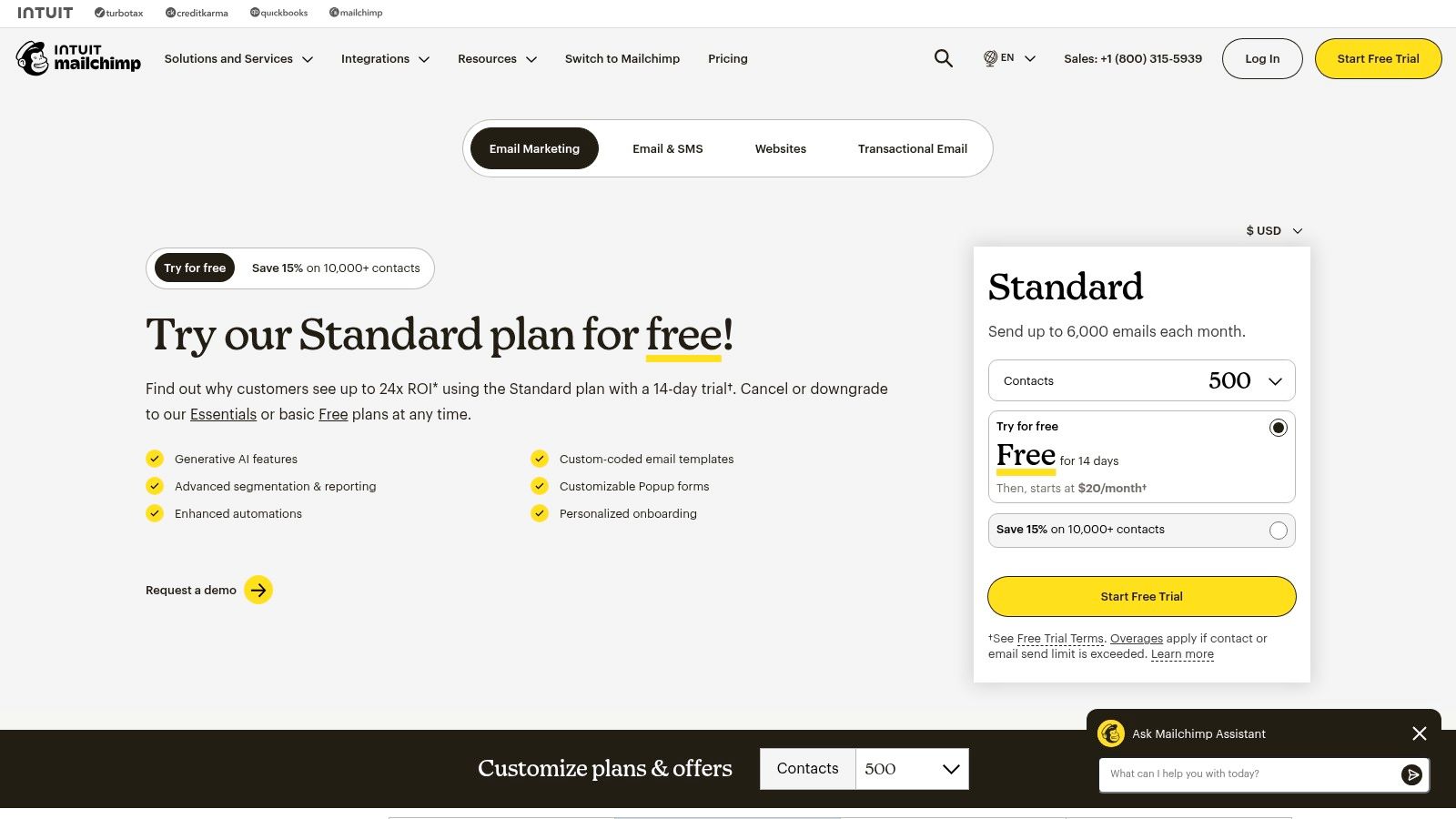
Unlike more complex enterprise systems, Mailchimp focuses on streamlined, results-driven automation that directly impacts the bottom line. For instance, a Shopify merchant can easily set up a "first purchase" automation that segments new customers and sends them a targeted offer for their next order, a proven strategy to boost online sales and increase lifetime value. This practical approach, combined with its growing SMS and social media features, provides a solid foundation for multichannel marketing.
Key Features & Pricing
Mailchimp offers a clear, scalable pricing structure that allows businesses to grow without migrating platforms.
- Pricing: Starts with a Free plan. Paid tiers include Essentials (from $13/mo), Standard (from $20/mo), and Premium (from $350/mo).
- Unique Offerings: The AI-powered "Content Optimizer" analyzes email copy against industry benchmarks to predict performance and suggest improvements before sending.
- Integrations: Features over 300 integrations, including seamless connections with major e-commerce platforms like Shopify, WooCommerce, and Stripe.
Pros:
- Extremely easy onboarding process with a vast library of high-quality email templates.
- Clear and transparent plan structure suitable for small to medium-sized businesses.
- Regularly offers promotional deals and extended trials for new users.
Cons:
- Pricing scales significantly with the size of your contact list and email send volume.
- Advanced automation and A/B testing features are reserved for higher-priced tiers.
- Lacks the deep, enterprise-level controls found in platforms like Marketo or Salesforce.
Website: https://mailchimp.com/pricing/marketing
7. Klaviyo
Klaviyo has cemented its position as the go-to marketing automation platform for direct-to-consumer (DTC) brands, particularly those built on Shopify. Its core strength lies in its deep, native integration with e-commerce platforms, allowing it to pull in a rich dataset of customer behaviors like products viewed, items added to cart, and purchase history. This enables retailers to build highly granular segments and trigger automated flows with exceptional precision, moving far beyond generic email blasts.
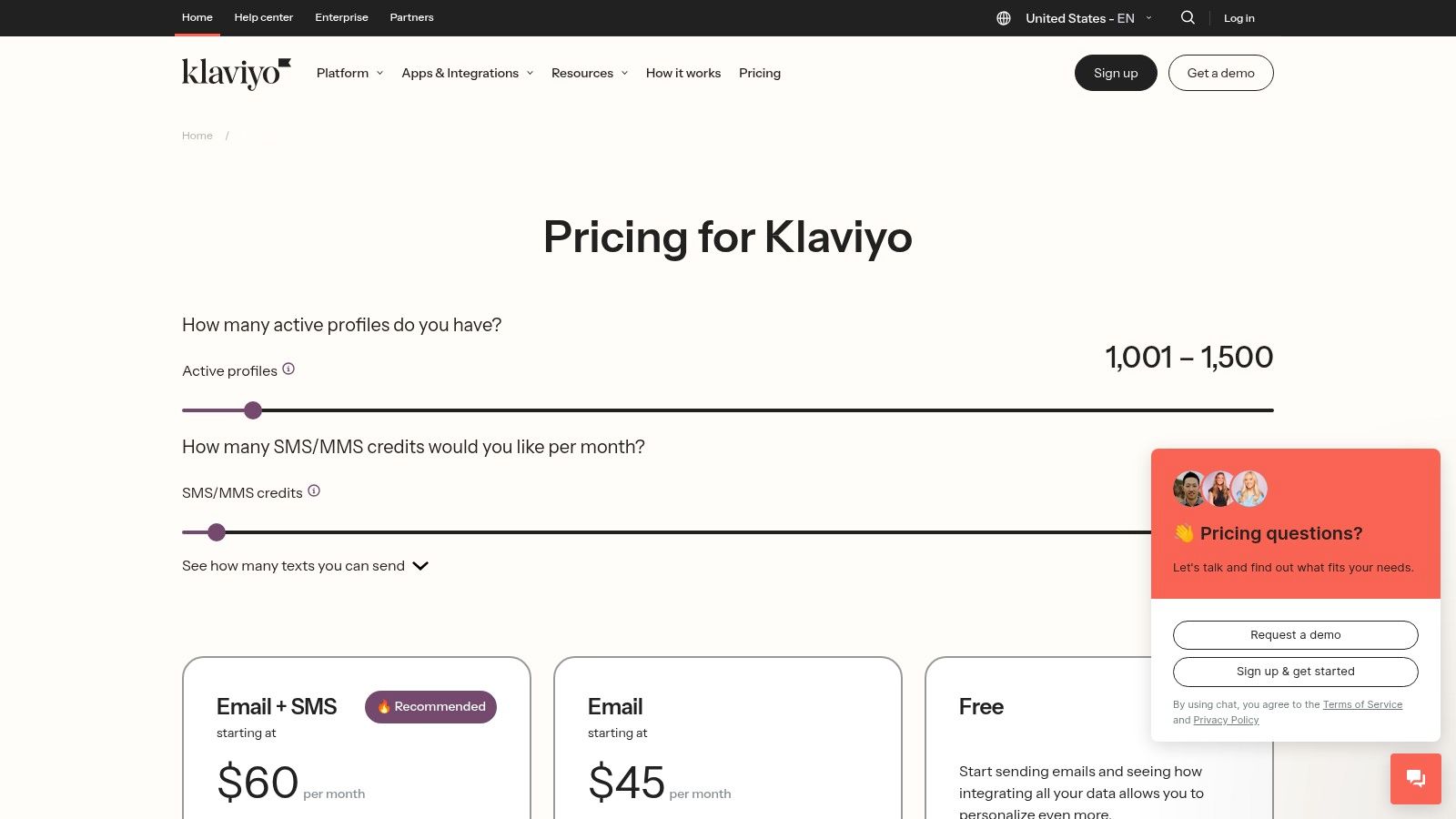
Unlike all-in-one platforms that try to do everything, Klaviyo focuses intently on e-commerce communication channels like email, SMS, and push notifications. This focus makes it one of the best marketing automation tools for driving revenue directly. For example, a Shopify store can use Klaviyo's predictive analytics to automatically segment customers likely to churn and target them with a personalized "win-back" campaign featuring a product recommendation based on their past purchases, all without manual intervention.
Key Features & Pricing
Klaviyo’s model is built around its powerful e-commerce data and segmentation capabilities, with pricing that scales alongside business growth.
- Pricing: A Free plan is available for up to 250 contacts. Paid plans for Email & SMS are usage-based, starting from $35/mo for 500 contacts and 1,250 SMS credits.
- Unique Offerings: Predictive analytics for calculating lifetime value, churn risk, and gender are built-in, fueling smarter segmentation and personalization.
- Integrations: Boasts over 350 integrations with a primary focus on the e-commerce ecosystem, including Shopify, BigCommerce, Magento, and WooCommerce.
Pros:
- Exceptional alignment with Shopify and Shopify Plus, considered best-in-class.
- Strong revenue attribution and pre-built e-commerce automation flows.
- Transparent pricing calculators make it easy to estimate costs for SMS credits and add-ons.
Cons:
- Pricing scales based on active profiles and sends, which can become costly as lists grow.
- Some long-term users have reported increased costs following recent billing changes.
Website: https://www.klaviyo.com/pricing
8. Brevo (formerly Sendinblue)
Brevo, formerly known as Sendinblue, carves out a unique space by offering a comprehensive suite of marketing and sales tools at an exceptionally competitive price point. It positions itself as an all-in-one platform for businesses that need robust multichannel capabilities-including email, SMS, and WhatsApp-without the enterprise-level cost. This makes it one of the best marketing automation tools for SMBs and e-commerce stores looking to scale their communication strategies on a budget.
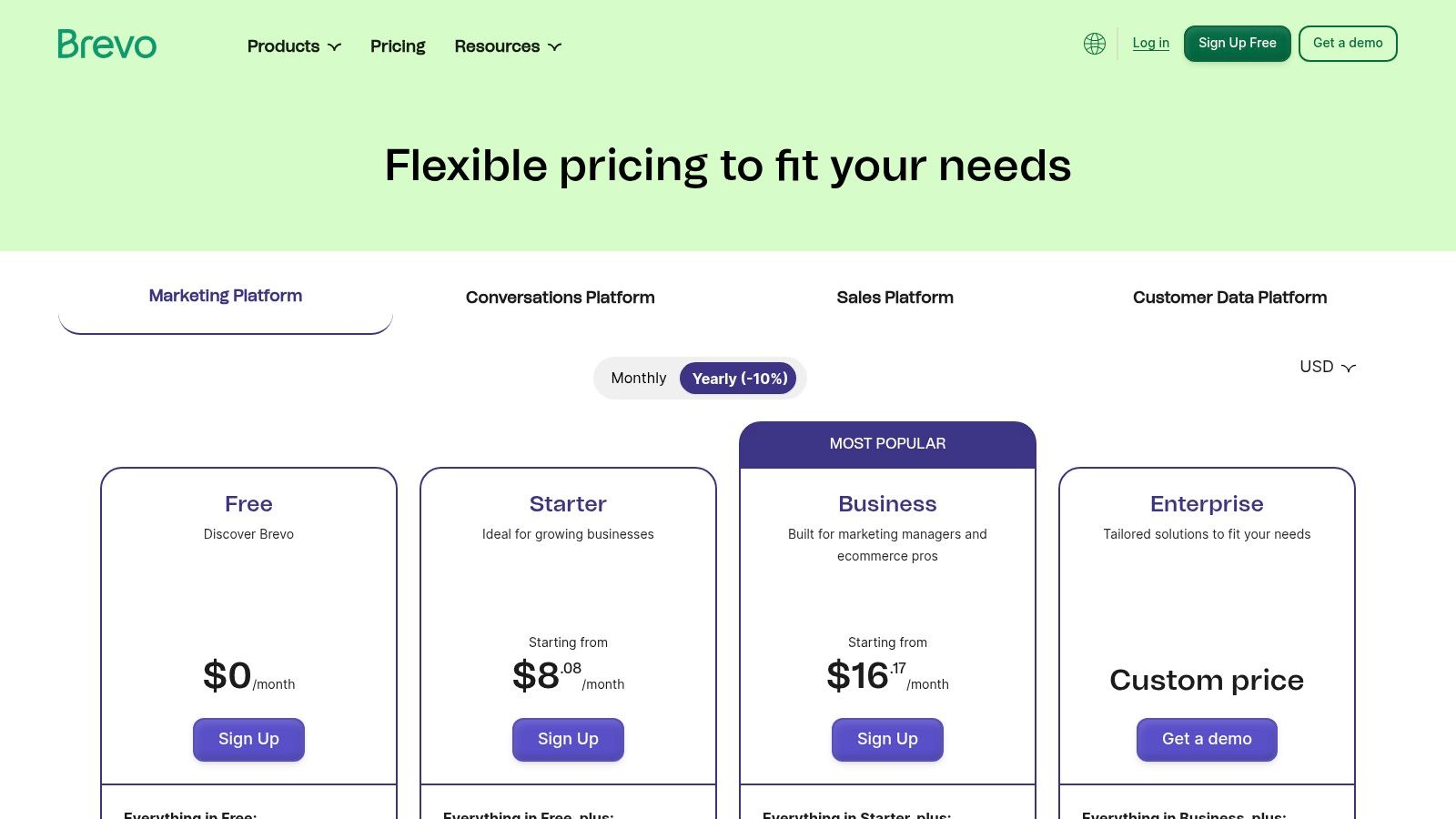
Unlike platforms that price primarily based on contact list size, Brevo's model is largely built around monthly email volume, offering more flexibility for businesses with large but less frequently engaged audiences. A key use case for a growing online store is leveraging its transactional email API for order confirmations and shipping updates while simultaneously running automated welcome series that combine email, SMS reminders, and web push notifications to new subscribers, all from a single, unified dashboard.
Key Features & Pricing
Brevo's strength is its feature-rich free plan and affordable entry-level tiers, making advanced automation accessible to almost any business.
- Pricing: A generous Free plan includes 300 emails/day. Paid plans are Starter (from $25/mo), Business (from $65/mo), and the customizable BrevoPlus Enterprise plan. Pay-as-you-go options are also available.
- Unique Offerings: The platform includes a sales CRM, live chat ("Conversations"), and landing page builder even on lower-tiered plans, providing immense value.
- Integrations: Offers a wide range of plugins for major e-commerce platforms like Shopify, WooCommerce, and Magento, as well as connections via Zapier.
Pros:
- Excellent free plan with a high daily sending limit.
- Low starting prices and flexible tiers based on email volume.
- Broad channel coverage (Email, SMS, WhatsApp, Chat) for the price.
Cons:
- Advanced analytics and multi-user access are reserved for higher-tier plans.
- The automation workflow builder can be less intuitive than some premium competitors.
Website: https://www.brevo.com/pricing
9. Zoho Marketing Automation
Zoho Marketing Automation provides a comprehensive, multi-channel marketing solution that is particularly powerful for businesses already invested in the Zoho ecosystem. Its native integration with Zoho CRM creates a seamless flow of data, allowing e-commerce brands to automate campaigns based on a complete customer profile, from lead acquisition to sales and support interactions. The platform’s visual journey builder empowers marketers to design sophisticated workflows across email, SMS, and social media without deep technical expertise.
Unlike standalone tools, Zoho's strength is its ability to serve as a central hub within a broader business operating system. A key use case for an SMB is triggering a lead nurturing sequence based on a prospect's behavior tracked on the website, automatically updating their lead score in Zoho CRM, and assigning a task to a sales representative once a certain threshold is met. This tight integration ensures marketing and sales teams are perfectly aligned, leveraging the same data to drive revenue and deliver a consistent customer experience. For those looking to streamline their outreach, understanding the value of simplicity in B2C marketing is key to building effective automated journeys.
Key Features & Pricing
Zoho’s pricing model is highly competitive, offering a feature-rich platform at a cost that is accessible for small and mid-sized businesses.
- Pricing: A limited Free plan is available. Paid plans are Standard (from $19/mo), Professional (from $30/mo), and Enterprise (from $46/mo), billed annually.
- Unique Offerings: The platform includes built-in webinar and survey tools, allowing marketers to capture leads and gather feedback within the same system.
- Integrations: Offers deep, native connections to the entire Zoho suite (CRM, Analytics, Commerce) and key third-party apps like Shopify and Salesforce.
Pros:
- Highly competitive pricing makes it one of the best marketing automation tools for SMBs.
- All-in-one suite approach provides incredible value if using other Zoho products.
- Broad feature set that covers the entire marketing funnel, from lead generation to retention.
Cons:
- The user interface can feel less modern and intuitive than some newer platforms.
- The third-party integration marketplace is smaller compared to industry giants like HubSpot.
Website: https://www.zoho.com/marketingautomation/
10. Omnisend
Omnisend carves out a powerful niche by focusing exclusively on the needs of e-commerce businesses, combining email, SMS, and web push notifications into a single, cohesive platform. It is designed for merchants who want to move beyond basic email campaigns and implement sophisticated, multi-channel sequences without a steep learning curve. The platform's deep integration with Shopify and WooCommerce allows for highly personalized automation based on real-time shopping behavior, like browsing a specific product category or abandoning a cart.
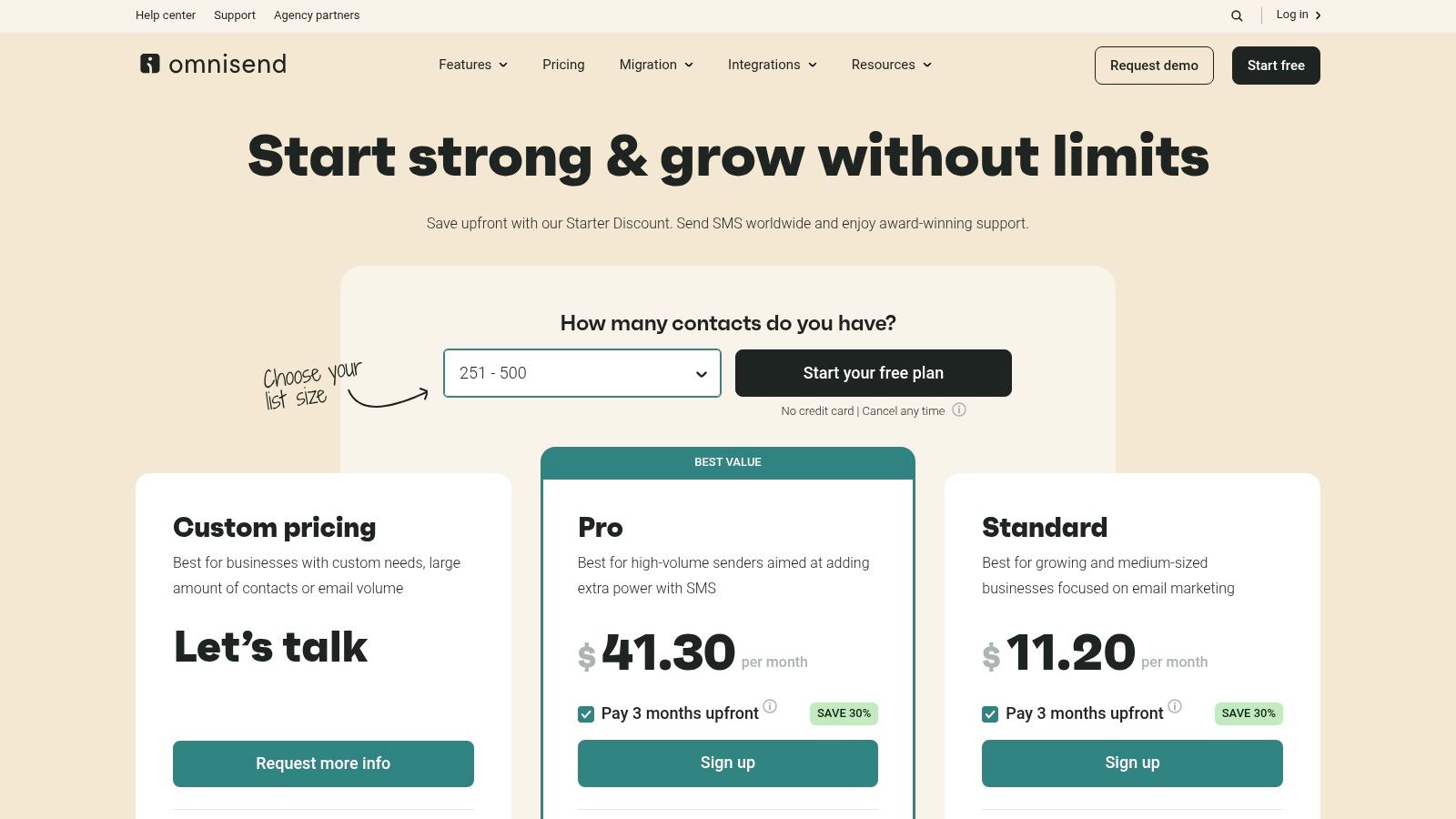
Unlike generic marketing automation tools, Omnisend’s entire feature set is built around driving sales for online stores. Its library of pre-built e-commerce workflows allows even new users to quickly launch proven campaigns like welcome series, browse abandonment, and post-purchase follow-ups. A Shopify store, for instance, could use Omnisend to automatically send a text message with a unique discount code 30 minutes after a shopper abandons their cart, followed by a web push notification an hour later if they still haven't purchased, creating a multi-touchpoint recovery strategy.
Key Features & Pricing
Omnisend’s value proposition is its combination of powerful features and generous free and paid plans, making it highly accessible for growing e-commerce brands.
- Pricing: Starts with a Free plan. Paid plans include Standard (from $16/mo) and Pro (from $59/mo), which includes SMS credits.
- Unique Offerings: The Pro plan includes unlimited emails and international SMS capabilities, providing predictable costs as your marketing scales.
- Integrations: Offers robust, one-click integrations with major e-commerce platforms like Shopify, Shopify Plus, BigCommerce, and WooCommerce.
Pros:
- Generous free plan with access to most features for up to 250 contacts.
- Excellent 24/7 live chat and email support are available on all plans, including the free tier.
- Pre-built automation workflows are specifically designed to increase e-commerce revenue.
Cons:
- The platform is highly e-commerce-focused, making it less suitable for B2B or service-based businesses.
- Advanced features like a dedicated Customer Success Manager are tied to higher-tier Pro plans with significant monthly spending.
Website: https://www.omnisend.com/pricing/
11. Drip
Drip establishes itself as an ECRM (E-commerce Customer Relationship Management) platform, moving beyond generic email marketing to offer deep, revenue-focused automation for online stores. Its core strength lies in its powerful segmentation and personalization capabilities, which are natively designed to leverage data from e-commerce platforms like Shopify and BigCommerce. This allows for hyper-targeted campaigns based on specific customer actions, such as viewing a product, making a purchase, or even abandoning a high-value cart.
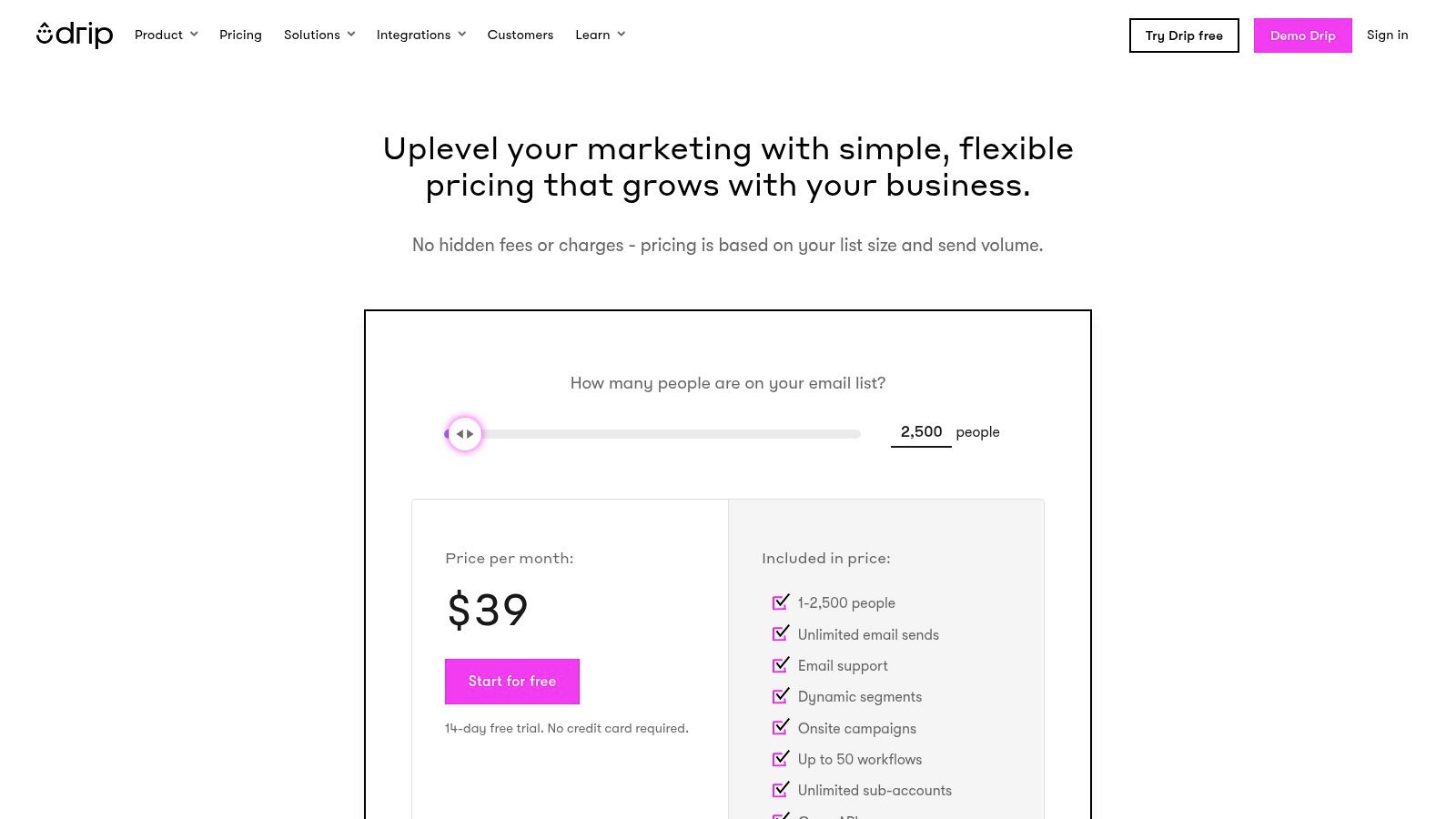
Unlike broad-spectrum tools, Drip's features are purpose-built for commerce. The visual workflow builder includes pre-built playbooks for common e-commerce scenarios like welcome series, post-purchase follow-ups, and win-back campaigns. A practical use case would be a workflow that triggers a personalized email with dynamic product recommendations based on a shopper's browsing history, and if they don't engage, follows up with an SMS message featuring a limited-time offer. This is an effective way of using urgency psychology to boost conversions.
Key Features & Pricing
Drip's pricing is refreshingly simple, offering all features across its plans and scaling only with your contact list size.
- Pricing: Starts at $39/mo for up to 2,500 contacts, with email and SMS pricing scaling from there. A 14-day free trial is available without a credit card.
- Unique Offerings: Provides detailed revenue dashboards that tie automation workflows and email campaigns directly to sales, making it easy to track ROI.
- Integrations: Deep, native integrations with Shopify, BigCommerce, and WooCommerce are central to its functionality, alongside a library of other marketing app connections.
Pros:
- All features are available on every paid plan, avoiding feature-gating.
- The platform is specifically designed for the needs of online stores.
- Strong focus on revenue attribution reporting.
Cons:
- Can become more expensive than entry-level tools as your contact list grows.
- Lacks the advanced B2B lead management features found in platforms like Salesforce or Marketo.
Website: https://www.drip.com/pricing
12. Iterable
Iterable is an enterprise-grade, cross-channel marketing platform designed for creating highly individualized customer experiences at scale. It moves beyond traditional email automation, enabling brands to compose sophisticated journeys across email, SMS, push notifications, in-app messages, and even WhatsApp. Its core strength lies in its ability to ingest and centralize real-time customer data, forming a complete profile that fuels hyper-personalized and behavior-driven campaigns.
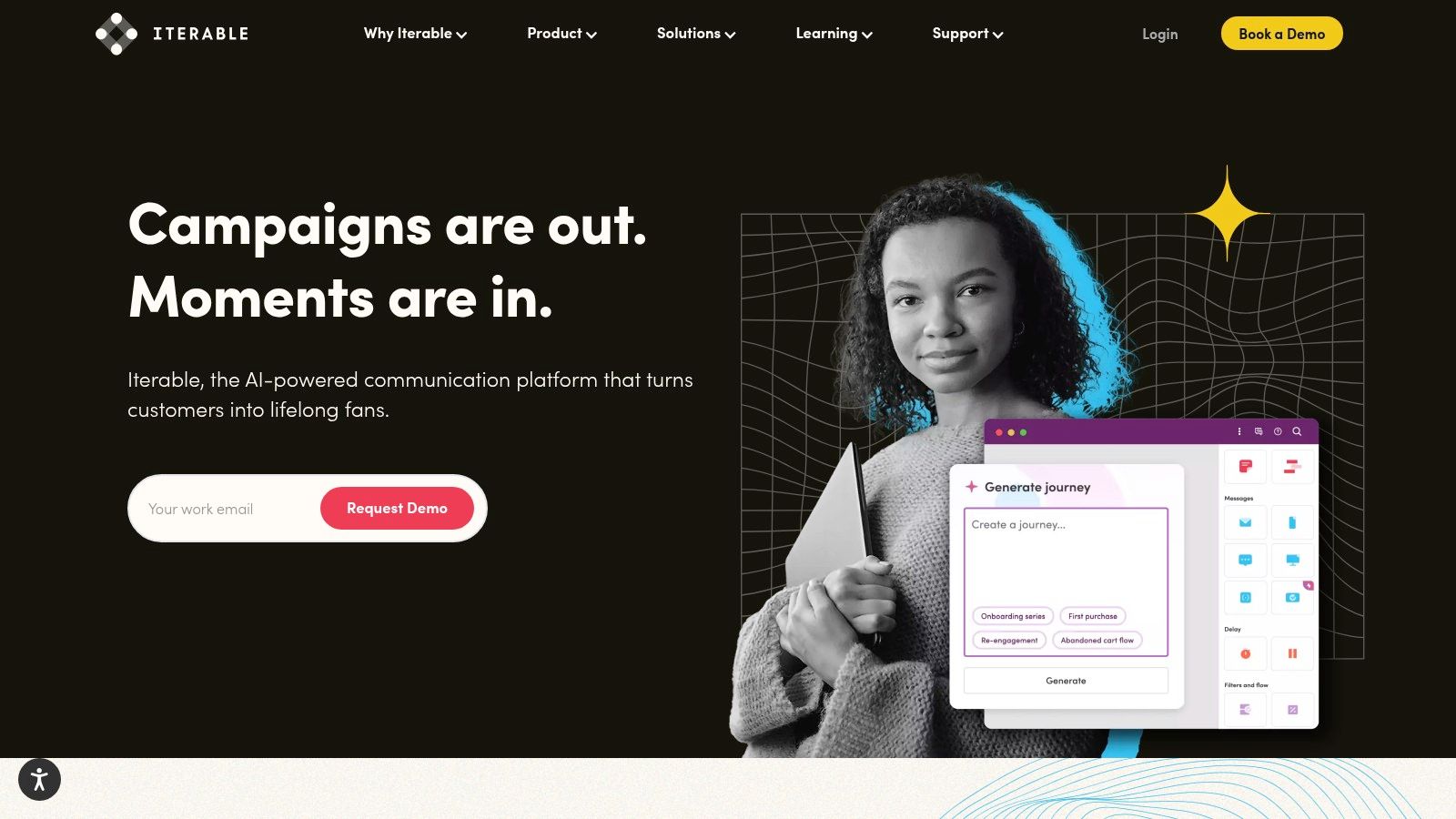
Unlike many tools that require separate systems for different channels, Iterable provides a single, unified workflow builder. This makes it one of the best marketing automation tools for orchestrating seamless, multi-touchpoint communication. For a large Shopify Plus merchant, a practical use case would be a post-purchase journey that sends an order confirmation email, followed by a push notification with shipping updates, and an SMS message asking for a product review two weeks after delivery, all managed from one interface.
Key Features & Pricing
Iterable is built for data-mature organizations ready to leverage AI and deep personalization to drive engagement and revenue.
- Pricing: Custom quote-based pricing tailored to message volume, data usage, and feature set. It is positioned for mid-market and enterprise clients.
- Unique Offerings: The platform's AI suite includes predictive audiences, send-time and channel optimization, and generative AI assistance for creating journey logic and copy.
- Integrations: Offers robust integrations with major data warehouses like Snowflake, analytics platforms like Segment, and e-commerce leaders like Shopify.
Pros:
- Powerful data activation and AI-driven personalization capabilities.
- Broad support for multiple channels, including WhatsApp and embedded messaging.
- Robust enterprise security, governance, and compliance options.
Cons:
- Premium, quote-based pricing is not publicly available and can be a significant investment.
- Requires a strong data infrastructure and strategy to fully leverage its advanced features.
Website: https://iterable.com
Marketing Automation Tools Feature Comparison
| Platform | Core Features & Capabilities | User Experience & Quality Metrics | Value Proposition | Target Audience | Price Points & Notes |
|---|---|---|---|---|---|
| Quikly | Urgency marketing science, behavioral triggers, "Moments" | No-code builder, seamless Shopify integration | +41% conversion, +36% sales ROI, profit margin protection | Shopify & Shopify Plus brands | Custom pricing; focused on revenue impact |
| HubSpot Marketing Hub | Visual workflows, CRM integration, multi-channel marketing | Strong free tools, mature education content | Scales from free to enterprise automation | SMB to enterprise marketers | Clear tiered pricing; contact-based scaling |
| Salesforce Marketing Cloud (Pardot) | Lead scoring, ABM dashboards, Salesforce integration | Enterprise-grade, scalable, sandbox support | Deep Salesforce alignment | B2B and enterprise marketing | Premium pricing, annual contracts |
| Adobe Marketo Engage | Advanced ABM, segmentation, Salesforce & analytics integr. | Enterprise scalability, deep functionality | Proven at large enterprises | Complex B2B and B2C teams | Quote-based pricing; high complexity |
| ActiveCampaign | Drag-drop automation, omnichannel, CRM add-ons | Intuitive builder, broad integrations | Strong email deliverability, AI features | SMB to mid-market | Pricing by contacts & channels; add-ons vary |
| Mailchimp (by Intuit) | Prebuilt journeys, 300+ integrations, AI content | Easy onboarding, clear tiered plans | Popular for startups & SMBs | Small businesses and startups | Free and tiered pricing; contact-based limits |
| Klaviyo | Email/SMS, predictive analytics, Shopify focused | Strong segmentation, revenue attribution | Highly aligned with DTC & Shopify | DTC brands, ecommerce marketers | Price scales with list size and sends |
| Brevo (formerly Sendinblue) | Email, SMS, WhatsApp, pay-as-you-go options | Flexible tiers, free plan with daily limits | Budget-friendly multichannel marketing | SMBs seeking multichannel | Low-cost tiers; feature limits on entry plans |
| Zoho Marketing Automation | Customer journeys, lead scoring, Zoho suite integration | Competitive pricing, broad SMB feature set | Benefits when used with Zoho CRM and tools | SMBs on Zoho | Cost-effective; smaller app ecosystem |
| Omnisend | Ecommerce workflows, SMS/web push, product reviews | Fast setup, 24/7 support | Strong SMS value with credits | Ecommerce marketers | Tiered pricing; limits on standard plan |
| Drip | Visual workflows, deep ecommerce integrations, revenue focus | All features on paid plans, 14-day free trial | Ecommerce-focused automation | Online stores and SMEs | Pricing scales with contacts |
| Iterable | AI-driven personalization, multi-channel, real-time data | Enterprise-grade, powerful data activation | Advanced AI & cross-channel support | Mid-market to enterprise | Quote-based premium pricing |
Automation Is the Engine, Psychology Is the Fuel
Navigating the landscape of the best marketing automation tools can feel overwhelming. We've journeyed through a dozen powerful platforms, from enterprise-grade giants like Marketo and Salesforce Marketing Cloud Account Engagement to e-commerce powerhouses like Klaviyo and Omnisend. Each offers a unique combination of features, from HubSpot's all-in-one CRM approach to ActiveCampaign's focus on customer experience automation.
The core takeaway is clear: marketing automation is no longer a luxury but a fundamental necessity for scalable growth, especially in the competitive e-commerce arena. These tools are the engines that power your marketing, executing complex workflows, segmenting audiences with precision, and delivering personalized messages at scale. They handle the repetitive, data-intensive tasks that would otherwise consume countless hours, freeing your team to focus on strategy and creativity.
However, a powerful engine is useless without the right fuel. That fuel is a deep understanding of consumer psychology.
The Human Element in Automation
The most sophisticated automation workflow will fall flat if it ignores the fundamental principles of human behavior. Why do customers abandon carts? What motivates them to make an immediate purchase? Research in behavioral economics shows the answers lie in psychological triggers like scarcity (limited stock), social proof (customer reviews), and anticipation (upcoming drops).
Simply setting up an abandoned cart email isn't enough. The true masters of e-commerce weave these psychological principles directly into their automated sequences. They don’t just send a reminder; they create a moment of urgency based on the fear of missing out (FOMO). They don’t just show a product; they highlight its popularity and the risk of it selling out. This is the critical difference between generic automation that feels manipulative and a high-performance marketing machine that drives tangible revenue growth.
Understanding these concepts is paramount. For deeper insights into the principles that drive successful campaigns, exploring resources on top advertising strategies for your Shopify store can provide valuable 'fuel' for your automation efforts.
How to Choose Your Marketing Automation Platform
As you make your final decision, move beyond feature checklists and focus on your specific business context. Use these questions as your final guide:
- What is my primary business model? An e-commerce brand on Shopify Plus has vastly different needs (deep data sync with Klaviyo, advanced segmentation with Drip) than a B2B SaaS company that would thrive on Salesforce or HubSpot's lead scoring and CRM integration.
- What is my team's technical skill level? Platforms like Mailchimp and Brevo offer user-friendly interfaces ideal for smaller teams, while Marketo and Iterable demand more specialized expertise for implementation and management. Be honest about your internal resources.
- What does my existing tech stack look like? Your chosen tool must integrate seamlessly with your e-commerce platform (Shopify, BigCommerce), CRM, helpdesk, and analytics tools. Poor integration creates data silos and negates the benefits of automation.
- How will this tool scale with me? Consider the pricing tiers and feature sets. A tool that's affordable today might become prohibitively expensive as your contact list grows. Plan for your one-to-three-year growth trajectory.
Ultimately, the best marketing automation tool is the one that becomes an invisible, indispensable part of your growth strategy. It should empower you to not only execute tasks efficiently but to build more meaningful, psychologically resonant relationships with your customers. Choose wisely, implement thoughtfully, and watch your engine drive unparalleled results.
Ready to inject proven consumer psychology directly into your marketing? Quikly moves beyond basic timers and pop-ups, using behavioral science to create high-impact urgency "moments" that drive immediate action and significant revenue. See how the next generation of urgency marketing can supercharge your automation efforts by visiting Quikly.

The Quikly Content Team brings together urgency marketing experts, consumer psychologists, and data analysts who've helped power promotional campaigns since 2012. Drawing from our platform's 70M+ consumer interactions and thousands of successful campaigns, we share evidence-based insights that help brands create promotions that convert.
